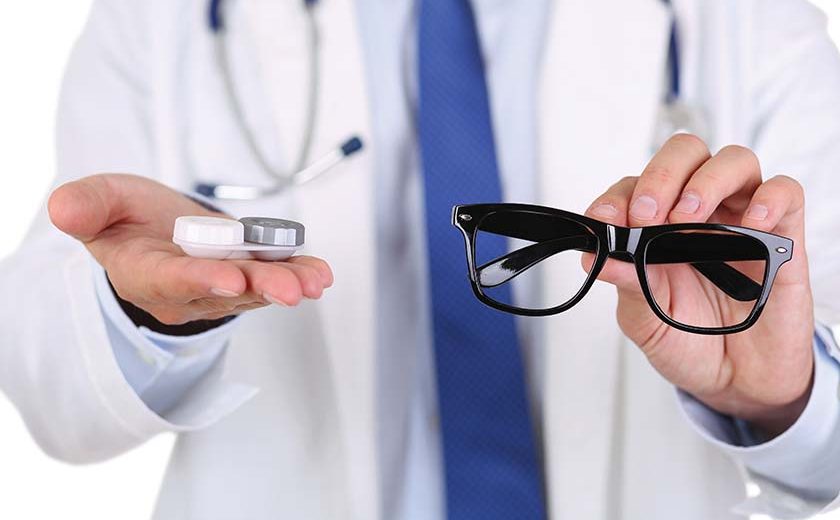It’s estimated that approximately 60 percent of the population uses vision correction, with the most popular options being contact lenses and glasses.
While your specific situation may demand that you use one method over the other, many people are good candidates for either corrective solution. If you’ve been given your choice of glasses or contacts, getting the facts about both options will help you make the best, informed decision for yourself.
The Advantages of Glasses
The most well-known refuted claim attributes the invention of glasses to Salvino D’Armati, from Florence, Italy where they were said to be invented between the years 1268 and 1289, and bifocals are generally credited to Benjamin Franklin. Glasses offer up great optics for a wide variety of vision issues, including presbyopia, hyperopia, astigmatism and myopia. Some advantages include:
- Crystal-clear optics that can be crafted for any prescription
- Glasses provide a shield of protection from dust and debris in the environment that can irritate eyes
- A wide variety of frames and tints available to allow you many fashionable choices
- You’re less likely to suffer from dry eye associated with wearing contact lenses for many hours
- Easy to put on and remove for different tasks
- Polycarbonate lenses are shatter-resistant and protect your eyes from dust, raindrops and wind
- Life-long glasses wearers often view their glasses as an integral part of their face and do not like their appearance without them
- In the long run glasses costs less than contact lenses as they require less frequent replacement
- Glasses require little cleaning and maintenance and because you’re not touching or putting anything into your eye, glasses significantly reduce the risk of any bacterial infection(s)
- In the long run glasses costs less than contact lenses as they require less frequent replacement
The Disadvantages of Glasses
With all of their positive attributes, glasses do have their negatives. Some of the disadvantages of glasses include:
- Peripheral vision can be blocked
- You may experience nausea or vertigo due to your extreme peripheral vision not being corrected, especially if your frames are small
- Glasses can be a hassle when you’re active. Not only do you have to make frequent adjustments to try and keep them from falling off, but you run the risk of losing and even breaking them
- Those sensitive to plastics and metals may experience discomfort where the nose pads and temples make contact with skin
- High prescriptions can be heavy on the nose and ears, bringing on sinus congestion, migraines and discomfort
The Advantages of Contact Lenses
Contacts were first envisioned in the early 1500s by famed artist and invention Leonardo da Vinci, but only became widely available in the 1980s. Since then, their popularity and ease of use has only increased. Some of the advantages of contacts include:
- Vision is corrected in the entire field of vision, including your peripheral vision.
- You can participate in physical activities (that don’t involve water) without the hassle and fear of having them break
- Soft contact lenses are safer for sports and, once inserted, can be forgotten for the day.
- Contacts do not fog up, slide down your nose or weigh heavily on your face. If a lens in scratched or gets dirty, you can discard it and use another.
- In some cases, contacts are much cheaper than specialty glasses.
The Disadvantages of Contacts
Not everyone is able to tolerate contact lenses, just as not everyone can master inserting and removing them. Other disadvantages include:
- Contact lenses are only manufactured in certain prescriptions. You may have to accept a slightly different power than you need.
- Some people experience irritation, burning or blurred vision with extended wear as the amount of oxygen reaching the eye is reduced.
- It can sometimes take time for them to sit comfortably in your eye which may require some adjustment.
- Require frequent cleaning and maintenance to reduce the risk of bacterial infections.
- Depending on your prescription and brand needs, contacts can be much more expensive than glasses
- Unless your prescription is very mild, you will likely want to purchases glasses to use as back up. This can increase your costs
Glasses and contact lenses are both excellent options for vision correction. As with many medical decisions, your choice is highly personal and individual. Your optometrist can work with you to fit your vision correction to your needs, and he or she can also order you trial contact lenses if you’re curious about trying them.


